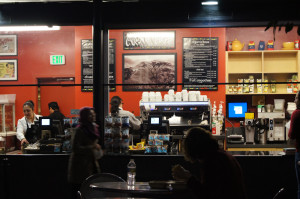
The Coupa Café franchise reports a steady stream of unconventional revenue through Bitcoin, a digital open-source currency, despite customers’ mixed responses to the payment method.
According to Jean Paul Coupal ‘07, co-founder and owner of Coupa Café, at least 50 different Bitcoin transactions have been processed since the introduction of the payment method four months ago. He added that the number of transactions has remained steady, if not slowly increasing.
“I get a notification on my phone every time someone buys at Coupa using Bitcoin,” Coupal said. “I get at least one to two a day. They’re adding up a lot. I might have to turn them off soon.”
As stated on its main site, Bitcoin “is the first decentralized peer-to-peer payment network that is powered by its users with no central authority or middlemen.”
As a result, Bitcoin can offer a higher degree of financial privacy to its users.
Coupa accepts Bitcoins through Quick Response (QR) codes. A customer wishing to pay in Bitcoins would scan Coupa’s QR code with a smartphone application, and directly transfer funds to the café—a process that, according to Coupal, takes the same amount of time as using a credit card.
“We always want to be at the forefront of technology, especially in a way that our customers could interact with in their day-to-day activities,” he added. “So, being able to accept Bitcoins in order to get a latte or a cappuccino is in line with our vision.”
Some customers were hesitant about using Bitcoins for Coupa Café. Hart Goldman ‘15 said he knew of Bitcoins but wouldn’t use them as a payment method.
“I think that [Bitcoins] are a novelty, but there might be some motivation behind using them…like being off the grid,” Goldman said.
Han Lee ‘15 found Bitcoins frustrating to use.
“Converting real U.S. dollars into Bitcoins is a painful process that disincentivizes consumers to adopt the system,” Lee said.
Bitcoins can be acquired through online Bitcoin exchange websites and marketplaces, and stored on digital Bitcoin accounts.
John Backus ‘16, a member of the Stanford Bitcoin Group that develops Bitcoin programs and services, thought that Bitcoins were better suited for digital transactions, not at a café.
“At first, [the real-life use of Bitcoins] seems sort of gimmicky,” he said. “The option of obtaining them in person isn’t strictly practical in my opinion.”
Backus also noted Bitcoin’s volatility as a newer form of currency.
“You have issues like the Bitcoin possibly going up 20 or 30 dollars [in value] in a day,” he said.
To counteract the currency’s volatility, Coupa Café’s Bitcoin system has safeguards in place to facilitate its use.
“We program the current exchange rate of Bitcoin versus dollar so if the [value of Bitcoin] goes up or down, you’re actually quoted real-time what the exchange rate actually is,” Coupal said.
As a digital currency, Backus still argues that Bitcoin’s place is online.
“I absolutely think [Bitcoin use] will extend beyond Coupa in terms of other businesses,” Backus said. “It’s way more practical in an online space because it’s a truly digital currency.”
Contact Gabbi Fisher at gsfisher ‘at’ stanford.edu.
